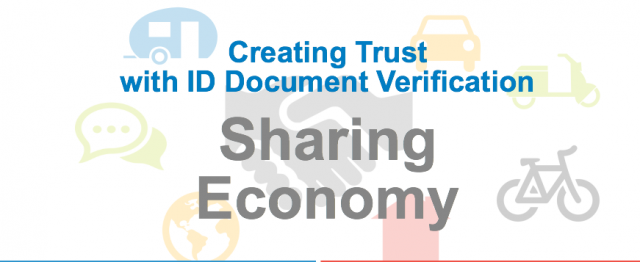The sharing economy is expected to grow from $14 billion in 2014 to $335 billion by 2025, based on the pace at which companies such as Uber and Airbnb are growing. A crucial bone to this sky-rocketing growth is the ability of sharing economy businesses to create trust in an increasingly device-connected world where the majority of transactions are conducted online.
A first and key step to create this trusted environment is verifying users’ identities. The general assumption is that if a person is using their true identity, then they are more likely to behave honestly and responsibly. In other words, verifying that the person at the other end of these peer-to-peer relationships is not only a real one but a trustworthy one, is imperative. More so when considering how pervasive the reverse of that is when it comes to fraud trends.
Within financial services, for example, the vast majority of fraud is conducted by individuals who are using stolen or synthetic identities. Since the U.S. switched to EMV in 2015, existing card fraud – fraud which was committed in person - has decreased. However, fraud conducted online keeps increasing and at speed: the number of identity fraud victims was at its peak in six years at 15.4 million, resulting in a 113% jump in new account opening fraud since 2015 and a 40% increase in card-not-present fraud in 2016.
Taking the financial services industry as a reference and using measured fraud in this space as a proxy, it’s incumbent on those building sharing economy platforms to perform identity verification to a high level of confidence if they want to keep fraudulent activity at bay; to put a strong front door in place now rather than having to remediate fraudulently opened accounts at a later stage.
AirBnB has always been the sharing economy trailblazer, also when it comes to creating trust. Back to 2013, they added identity verification to its platform, fostering trust in their particular peer-to-peer marketplace and enabling users to start building their trusted, online reputation.
Using ID document verification to create trustworthy online identities in the sharing economy
 At Mitek we are directly focused on bringing the most embraced physical method of identity verification to digital transactions.
At Mitek we are directly focused on bringing the most embraced physical method of identity verification to digital transactions.Our technology enables the assessment of a government-issued ID leveraging the user’s smartphone’s camera. For example, if you were renting a car or a home in a traditional way, this is, in person, you would have to show your ID to an individual, and they would be able to see that you are the person on that ID.
One of the challenges we have observed across different verticals is that the quality by which that identity check is done in person can have very wide ranges of variation, from a very disengaged individual who barely checks, to someone who is using a hardware device to look at the security features of the ID document presented for identity verification.
In addition to that, identity documents generally come with security features that, if scanned for and assessed properly, provide high assurance and reliance on it is authentic and was rightfully issued. In this vein, latest IDs such as electronic passports (currently more than 730 million out of the over 900 million passports in circulations, according to ICAO) are incredibly functional and offer enhanced security, becoming the preferred root identity credential for account opening, authorizing digital payments or transact securely online.
Another benefit of e-passports being increasingly used as secure means of digital identity is that, when combined with technology such as NFC, allow e-passport owners to identify and authenticate themselves , open accounts and enroll with services via NFC-enabled mobile smartphones or wearable formats, satisfying at once the security imperative and consumers’ demands for ease of use, speed and convenience.
The opportunity to make this a more consistently reliable process via technology while embracing the global trend in using digital is huge. And the guiding principle that in general a reliable check of a government issued ID is a cornerstone of great identity verification is sound. Government issued IDs are extraordinarily hard to get, so having one is very indicative that you are real person.
On a related note, there is another important consideration to make about the importance of identity confidence in the sharing economy. There have been a few recent in-depth surveys about consumer sentiment regarding identity when it comes to participating in sharing economy transactions and they pretty much all corroborate the fact that around 70% of consumers in the U.S. and UK will not participate in “significant” or high-value transactions without identity confidence. So, reached this point, identity as the cornerstone of trust is critical to unlocking the full sharing economy potential.